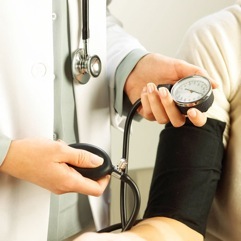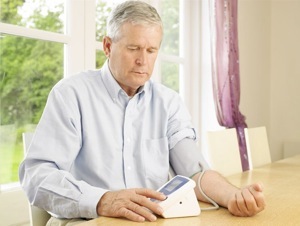-
General Health Conditions







High Blood Pressure
High blood pressure (HBP) is when blood moves through the arteries at a higher pressure than normal. The heart strains to pump blood through the arteries.
Blood pressure is measured with a blood pressure cuff placed on the arm. The first (higher) number measures systolic pressure. This is the maximum pressure against the artery walls while the heart beats. The second (lower) number measures diastolic pressure. This is the pressure between heartbeats, when the heart refills. The results are given as systolic/diastolic pressure, such as 120/80 mm Hg.






Self-Care / Prevention
To Help Prevent High Blood Pressure
-
•Get to and/or stay at a healthy weight.
-
•Don’t smoke. If you smoke, quit.
-
•Limit alcohol to 2 drinks or less a day for males; 1 drink or less a day for females and persons age 65 and older.
-
•Increase physical activity. Get regular exercise.
-
•Manage stress.
-
•Follow the DASH Eating Plan.
-
•Limit total sodium from table salt and salt and sodium in foods. Try to get no more than 1,500 to 2,400 milligrams per day. This is the amount in about 2/3rds to 1 teaspoon of salt. Read food labels for sodium content.
Do you have any risk factor for high blood pressure and have you not had your blood pressure checked within 2 years?
Treatment
When self-care measures are not enough, one or more medicines may be prescribed. If it is not treated, HBP can lead to heart, kidney, eye problems, and stroke.
Does a person with high blood pressure have any of these problems?
-
•Severe headache.
-
•Palpitations.
-
•Feeling dizzy.
-
•Numbness or tingling in the hands or feet.
-
•Confusion.
Do medicine(s) for high blood pressure make you dizzy or cause other problems?
Signs & Symptoms
There are usually no signs or symptoms. Only 2 out of 3 people with HBP know that they have it.
Causes
The exact cause is not known. Risk factors include:
-
•Family history of HBP.
-
•Aging.
-
•Smoking cigarettes.
-
•Race. HBP is more common in African Americans than in Caucasians.
-
•Gender. HBP is more common in men than in women.
-
•Being inactive. Obesity. Sleep apnea.
-
•Emotional distress.
-
•Too much sodium intake in some persons.
Questions to Ask
Get your blood pressure checked at each office visit, at least every 2 years, or as advised.

To Treat High Blood Pressure
-
•Follow tips to prevent HBP.
-
•Take medicine as prescribed. {Note: Most persons need more than one medicine to treat high blood pressure.} Tell your doctor about side effects. Are you dizzy? Do you feel faint? Do you have a dry cough without a cold?
-
•Limit caffeine.
-
•Discuss all prescribed and over-the-counter medicines with your doctor before you take them. Find out about drug and food interactions, too. You may be told not to have grapefruit juice if you take certain medicines. Your pharmacist can answer questions, too.
Check your blood pressure at home, as advised by your doctor.



For more information, contact:
HealthyLearn® | www.HealthyLearn.com. Click on MedlinePlus®.
The American Heart Association | 800.242.8721 | www.americanheart.org
National Heart, Lung, and Blood Institute (NHLBI) | www.nhlbi.nih.gov




Copyright © 2009, American Institute for Preventive Medicine. All rights reserved.